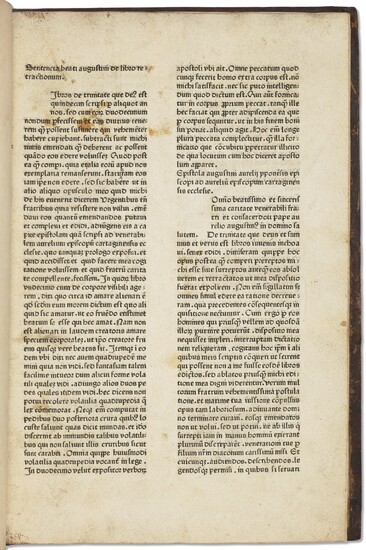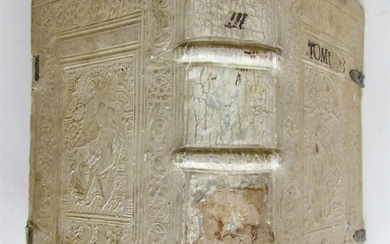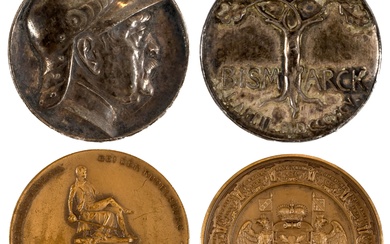De trinitate
AUGUSTINUS, Aurelius (354-430). De trinitate. [Strasbourg: Printer of Henricus Ariminensis Type 1 (Heinrich Eggestein), not after 1474.]
First edition of Augustine's treatise on the mystery of the Trinity. Prior to Augustine, much of the serious writing on Christian theology was produced in Greek and reliant on a fossilized system of philosophical jargon. Nowhere was precision of language so important as discussions of the Trinity, disagreements over which caused The Great Schism (and produced many a heresy). Augustine brought a fresh treatment of these discussions to the Latin-speaking world, which his influence has dominated ever since. Kurt Ohly (Gutenberg-Jahrbuch 1956, 1957) identified the books printed in this eponymous shop with Georg Reyser, but that identification probably extends to books printed in type 3 only. Type 1 may have been used in the shop of Eggestein, where it appears as a heading type in his Ludolphus de Saxonia (Goff L-337). HC *2034; GW 2925; BMC I, 78 (IC. 882); Goff A-1342; BSB A-876; ISTC ia01342000
Royal folio (360 x 251mm). 105 leaves (of 106, without final blank). Initial spaces left blank (some dampstaining around edges, a little worming in text at end, occasional stains). Old calf (rebacked, a little scuffed and worn). Provenance: Reverend Dr. William Johnston (1800–1874, Scottish Presbyterian minister; gift inscription from Andrew Barclay-Walker dated 1863; left in his will to:) – John Brown, M.D. (1810-1882, Scottish physician and author; inscription dated 1875).
View it on
Sale price
Estimate
Time, Location
Auction House
AUGUSTINUS, Aurelius (354-430). De trinitate. [Strasbourg: Printer of Henricus Ariminensis Type 1 (Heinrich Eggestein), not after 1474.]
First edition of Augustine's treatise on the mystery of the Trinity. Prior to Augustine, much of the serious writing on Christian theology was produced in Greek and reliant on a fossilized system of philosophical jargon. Nowhere was precision of language so important as discussions of the Trinity, disagreements over which caused The Great Schism (and produced many a heresy). Augustine brought a fresh treatment of these discussions to the Latin-speaking world, which his influence has dominated ever since. Kurt Ohly (Gutenberg-Jahrbuch 1956, 1957) identified the books printed in this eponymous shop with Georg Reyser, but that identification probably extends to books printed in type 3 only. Type 1 may have been used in the shop of Eggestein, where it appears as a heading type in his Ludolphus de Saxonia (Goff L-337). HC *2034; GW 2925; BMC I, 78 (IC. 882); Goff A-1342; BSB A-876; ISTC ia01342000
Royal folio (360 x 251mm). 105 leaves (of 106, without final blank). Initial spaces left blank (some dampstaining around edges, a little worming in text at end, occasional stains). Old calf (rebacked, a little scuffed and worn). Provenance: Reverend Dr. William Johnston (1800–1874, Scottish Presbyterian minister; gift inscription from Andrew Barclay-Walker dated 1863; left in his will to:) – John Brown, M.D. (1810-1882, Scottish physician and author; inscription dated 1875).

![De Sancta Trinitate libri tres contra huius aeui trinitarios, antitrinitarios, & autotheanos [with] Id., Ad Jacobum Schegkium assertionibus sacris de Deo sese temere immiscentem et tribus ipsius de sancta Trinitate libris responsio. De Sancta Trinitate libri tres contra huius aeui trinitarios, antitrinitarios, & autotheanos [with] Id., Ad Jacobum Schegkium assertionibus sacris de Deo sese temere immiscentem et tribus ipsius de sancta Trinitate libris responsio.](https://gcp-la8-storage-cdn.lot-art.com/public/upl/50/De-Sancta-Trinitate-libri-tres-contra-huius-aeui-trinitarios-antitrinitarios-and-autotheanos-with-Id-Ad-Jacobum-Schegkium-ass_1604239632_1069-thumb.jpg)




